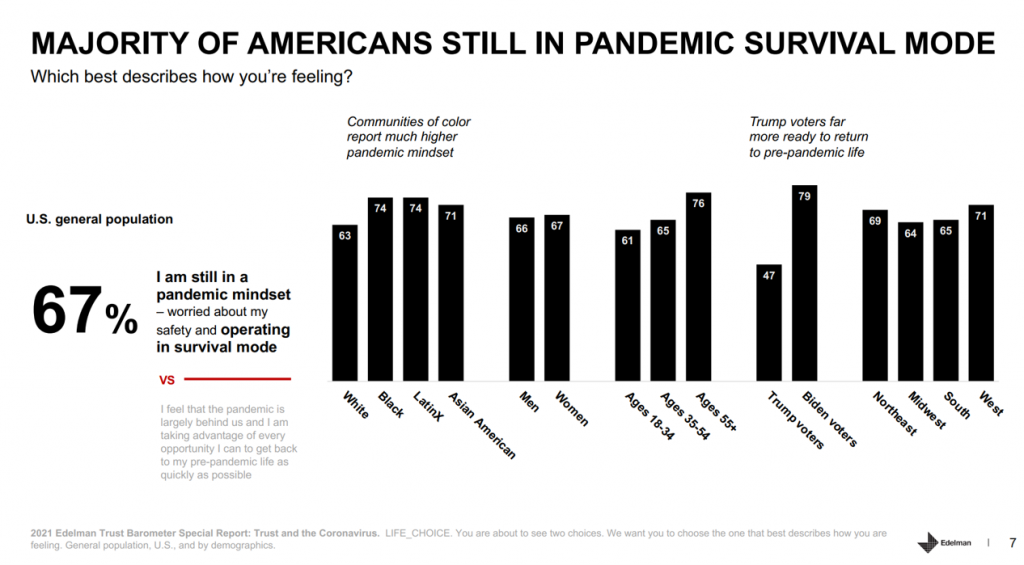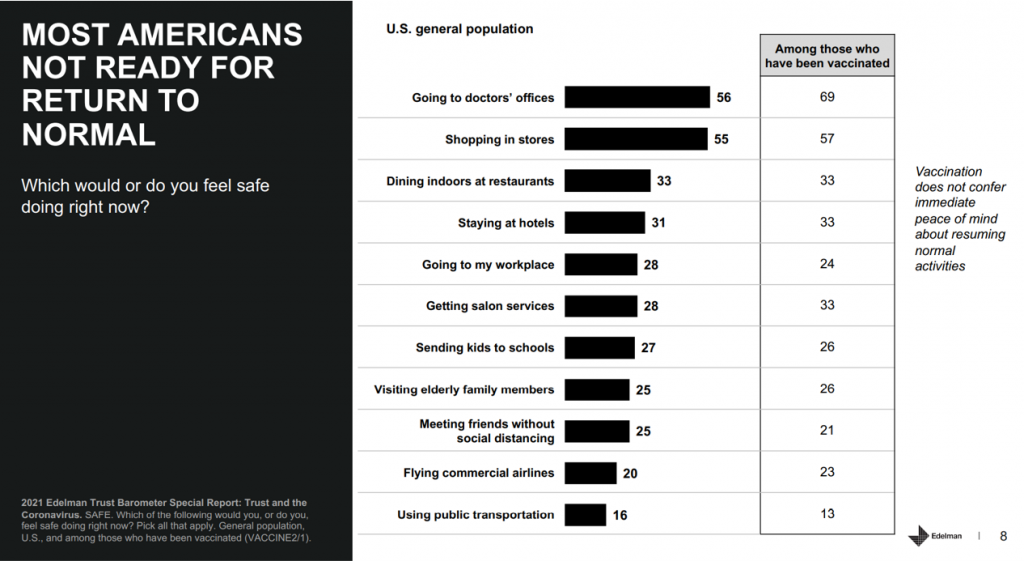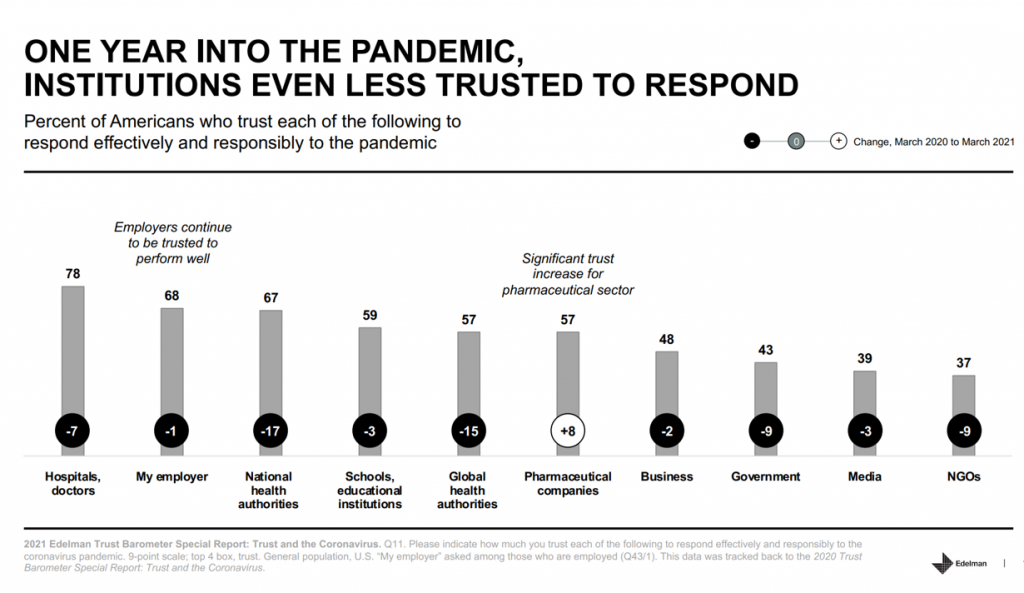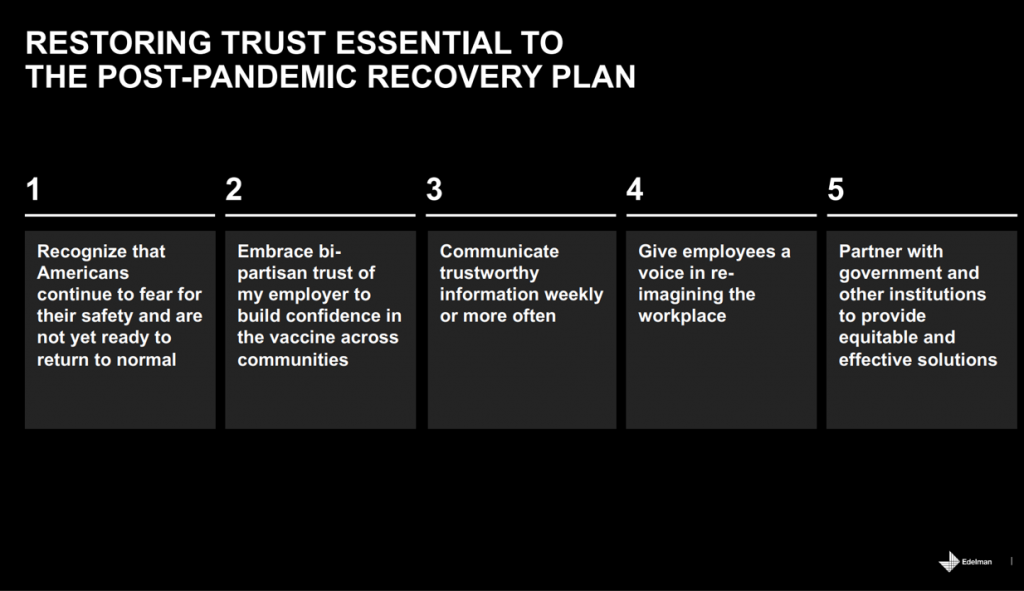A year into the COVID-19 pandemic, most Americans are still in “survival mode,” according to an update of the 2021 Edelman Trust Barometer, Trust and the Coronavirus in the U.S.
 Updating the company’s annual Trust Barometer, Edelman conducted a new round of interviews in the U.S. among 2,500 people in early March.
Updating the company’s annual Trust Barometer, Edelman conducted a new round of interviews in the U.S. among 2,500 people in early March.
[For context, you can read my take on the 2021 Edelman Trust Barometer published during the World Economic Forum in January 2021 here in Health Populi].
The first chart shows that two in three people in the U.S. are still in a pandemic mindset, worried about safety and operating in survival mode.
This sense of survival varies by race, age, and partisan politics. More people of color – Black, Asian-American and LatinX – feel more of the pandemic mindset compared with White people. More older people do, too, and about 50% more Biden voters than Trump voters, as well.
 In terms of getting back to some semblance of normal, people who have been vaccinated have different feelings than the general population — and not necessarily feeling safe yet to do certain activities,
In terms of getting back to some semblance of normal, people who have been vaccinated have different feelings than the general population — and not necessarily feeling safe yet to do certain activities,
Activities in which vaccinated health citizens do feel safe to engage include going to doctors’ offices (for 69% of vaccinated people compared with 56% overall), and getting salon services (33% versus 28%).
Some areas are at parity in terms of safety perceived by those who received vaccines compared with people who have not; roughly the same percentage of people would be comfortable shopping in stores (57%/55%), dining indoors at restaurants (33% each), staying at hotels (33% v. 31%), sending kids to schools (26%, 27%), visiting elderly family members (26%, 25%).
In contrast, more people without vaccinations would be comfortable meeting friends without social distancing: 21% of the vaccinated compared with 25% of the general population.
 Getting to the issue of trust, the crux of the Edelman research, a year into the pandemic finds an even greater erosion of trust in some institutions than people felt earlier in the pandemic, comparing sentiments between March 2020 and March 2021.
Getting to the issue of trust, the crux of the Edelman research, a year into the pandemic finds an even greater erosion of trust in some institutions than people felt earlier in the pandemic, comparing sentiments between March 2020 and March 2021.
Fewer Americans trusted National and Global Health Authorities (fall by 17 and 15 percentage points in the year), along with government (dropping by 9 points), NGOs (falling 9 points), and hospitals and doctors (dropping by 7 points).
The only stakeholder whose trust increased among U.S. consumers was the pharmaceutical industry, increasing by 8 points.
“My employer” stayed relatively even in trust among U.S. consumers.
 Health Populi’s Hot Points: If 2020 was our Year of COVID, 2021 is our Year of Vaccines, as Dr. Osterholm told me in our conversation held during the South-by-Southwest Festival last week.
Health Populi’s Hot Points: If 2020 was our Year of COVID, 2021 is our Year of Vaccines, as Dr. Osterholm told me in our conversation held during the South-by-Southwest Festival last week.
The most trusted sources for vaccine information as of March 2021 were my doctor or healthcare provider, scientists, public health officials, and other doctors and health experts folks followed online.
It’s informative to note differences in trust based on ethnicity, gender, age, and partisanship. Note that Black and LatinX consumers tend to trust celebrities more than White and Asian Americans do.
More men tend to trust business CEOs more than women do.
In terms of age, older people trust the science and doctors more than younger people, but younger people trust journalists, CEOs, and celebrities more on the topic of vaccine information.
And as for party identity, there are stark differences in trusted vaccine information based on whether a person voted for Biden or Trump for president:
- There is a huge 26 percentage point different in trusting scientists between Biden vs. Trump voters, with more Biden supporters trusting scientists for vaccine information
- Same trust gap exists for public health officials, many more Biden supporters trusting vaccine info from, say, the CDC or local public health department
- Overall, fewer Trump supporters trust ANY party for vaccine information with the smallest delta for CEOs in general in which 33% of Trump supports hold trust compared with 37% of Biden supporters.
 How to deal with these trust gaps, overall and within different communities?
How to deal with these trust gaps, overall and within different communities?
Edelman offers five tactics:
- Recognize that Americans are still fearful for their safety and not ready for a collective return to normal
- Embrace bipartisan trust of employers to build confidence in vaccines across communities
- Communicate trustworthy information very often
- Give employees a voice in re-imagining their workplaces to have a more comforting on-ramp to getting back to workspaces, and
- Partner with government and other institutions to provide equitable and effective solutions.
As we are seeing with vaccination delivery, more retail ecosystem partners are participating getting shots-into-arms closer to people in their (trusted) communities. Grocery stores, pharmacy chains, and pop-up locations in peoples’ neighborhoods are helping to build trust and herd immunity where people live, work, play, pray, and shop.
This won’t solve the huge partisan gaps in trust we see in this updated survey. But the sooner we can all get back to normal social and work-flows, the sooner we can have more face-to-face conversations to rebuild trust between each other.
